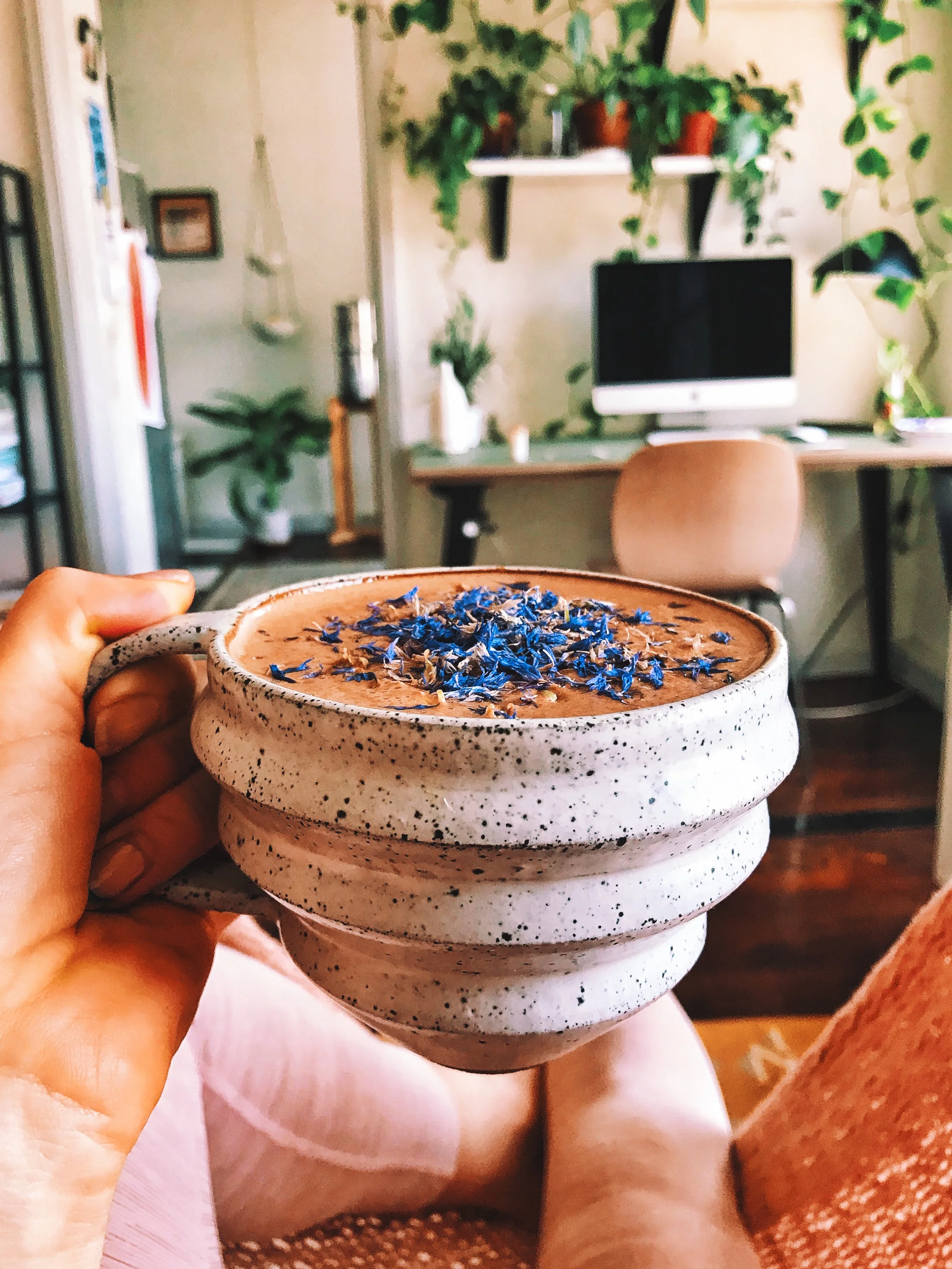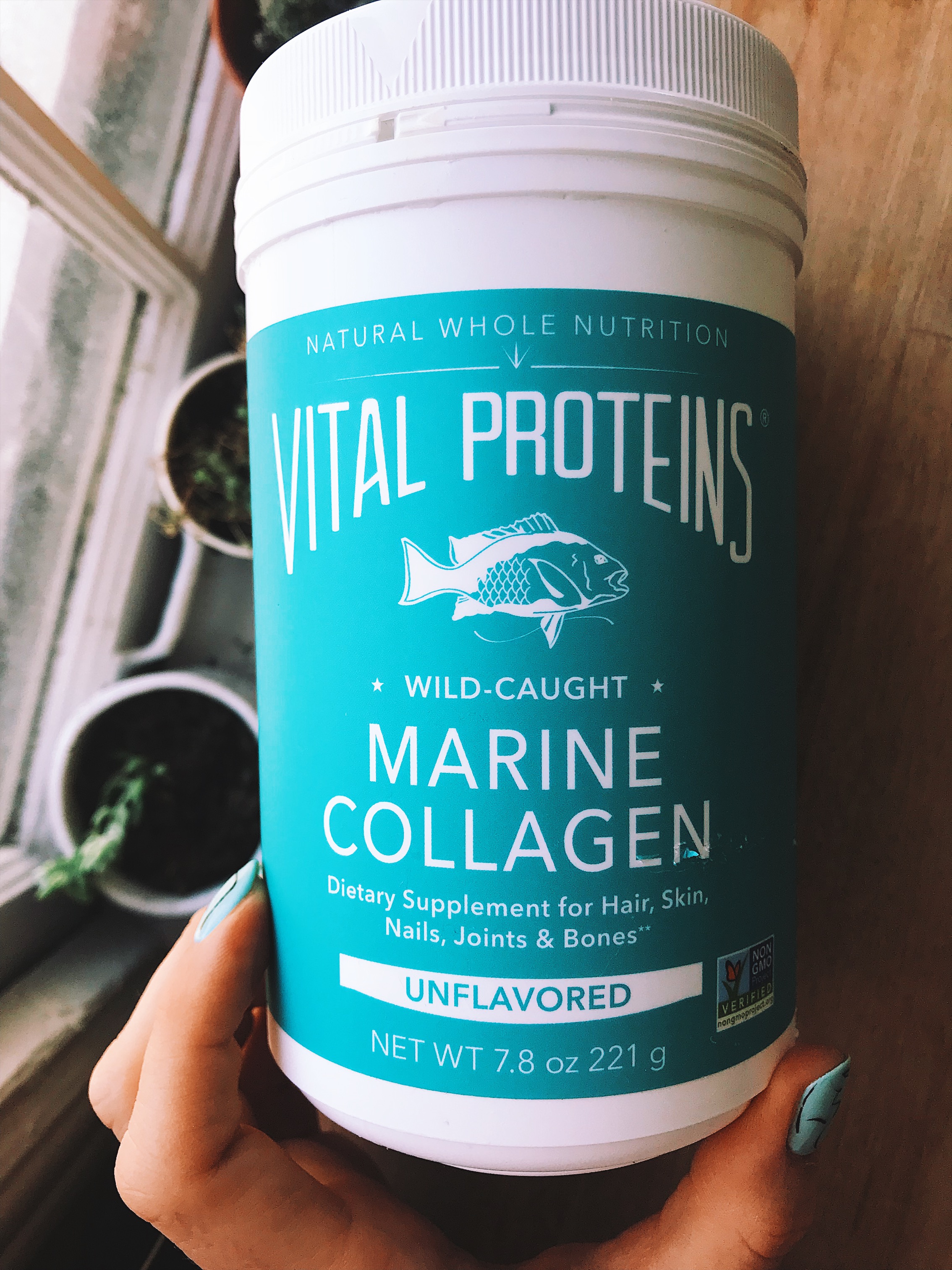Collagen Q+A

Note: This post is based off my own experience with Collagen. I am not a medical professional, doctor, or scientist. Take all of this information with a grain of salt, and do what feels best for you!
Welcome to 2018, where we take rides from strangers and it’s not weird (I'm looking at you, Uber), we’re sending cars to space (Elon Musk, nice one!), and we’re putting collagen in our lattes.
Just a little Earl Grey Collagen Latte. Recipe at the bottom of this post.
Collagen is seemingly everywhere. It's trending on your newsfeed and it’s in your local health food store’s supplement aisle. It boasts incredible benefits like glowing skin, long hair, a healthier gut, and joint/muscle pain relief. But does it really work?
Collagen is one of the top three topics people ask me about. As someone who’s been taking collagen for almost 2 years and thought they could never be the type of person to incorporate daily supplements, I figured I’d put together this little rapid fire Q+A post for you guys so you can learn from my experience. My hopes is that sharing my history with collagen will help you make an informed decision on whether collagen is right for you.
What is collagen?
Collagen is the cement that holds your body together. 30% of the protein in the human body is from collagen.
Technically speaking, collagen peptides are short chain amino acids. It is the main structural protein found in skin and connective tissue. The two most well known forms of collagen for human supplemental consumption are marine collagen and collagen peptides. Marine collagen is derived from fish, while collagen peptides are derived from grass-fed cows.
Can you taste it? Does it change the texture if you add it to liquid?
Personally, I can’t taste collagen. It does have a particular smell when you stick your nose in the powder, but no noticeable taste for either varieties.
If you’re a texture person, don’t fret: it doesn’t noticeably change the texture either. The only times I notice a textural difference is if I blend it into a hot or cold drink in my Vitamix. It makes drinks more frothy. I like that about collagen.
Why is collagen trendy AF?
I think people are really intrigued by the fact that ingesting collagen can change the appearance of skin. No longer is injecting collagen a trend as it was in the 80’s. People are looking for easier, more affordable, and less intrusive ways to keep their skin looking young and bodies feeling good. Enter collagen.
How has collagen helped you?
Collagen has helped my hair, skin, and nails. My nails grow faster and they are stronger. They grow so fast that 2 weeks after a mani, my nails are already grown out and I need a new one. My hair is shinier and skin is more "glowy", as one might say. All these byproducts of taking collagen are all just dandy, but they are things I could live without. Most importantly, I think collagen has helped rebuild my gut lining so that I can now tolerate more foods. My naturopath in 2016 suggested I begin incorporating collagen to help my detrimental bloat and gas issue. I was vegan at the time, and collagen was the first animal product I incorporated. Certain foods that used to make me bloat, constipate, ferment in my gut and cause nasty gas and skin rashes are now possible in small amounts. It took some time, but I truly think collagen has helped make my leaky gut and IBS symptoms more manageable. I'm looking at you, garlic and onions.
How soon did you notice changes after taking collagen?
It took 2 months to see changes. I took it every day for one year and noticed a huge difference in my skin’s appearance, but most noticeably my nails.
Vital Proteins is my go-to collagen brand.
Which brand do you like?
I take Vital Proteins! Always have, always will. I’m loyal to that brand.
What is your collagen routine?
I’ve been taking collagen every day for nearly two years. Once every other week or so, I will skip a day or two to keep my body guessing. Food intolerances can develop from over-consuming the same thing. I like to avoid food intolerances and don’t believe eating something everyday is good for me, no matter how healthy it may be.
I take one to two scoops a day, depending on what my body wants. An average serving is 15-20 grams a day. I started off with a little less than a full scoop to ease my body into it.
I usually take my collagen in the powder form in one of my matcha or earl grey lattes in the morning. It’s easiest for me to take it daily if I include it in a ritual, which is my morning potion routine. That way, I don’t forget, and it’s done.
What is the main difference between marine and peptides?
Marine collagen is made from fish. Peptides are made from cows. Peptides have 20g of protein per serving, while marine only has 12g. Nutritionally, though, they are very similar.
Left (teal): marine collagen
Right (blue): collagen peptides
Where are the Vital Proteins marine and collagen peptides sourced from?
It’s always a good idea to know where your animal proteins come from. Vital Proteins' Collagen Peptides are sourced from grass-fed, pasture-raised bovine from Brazil. The Marine Collagen originate from wild-caught, non-GMO verified red snapper scales from the shores of Hawaii.
Should you switch it up between types of collagen?
This is the marine collagen from Vital Proteins. I switch it up between the two types. And no, it does not have a fishy flavor for me.
I certainly switch up my collagen types to keep my body guessing. For example, once I’ve gone through a marine collagen container, I’ll switch back to peptides and vice versa. This helps keep the chances of becoming intolerant to an ingredient down. I’m not sure if people get intolerant to collagen, but I love it so much I’m definitely not taking my chances.
Pill or powder?
It’s up to you! I prefer powder, as its easy to incorporate into my drinks, but it’s just a personal preference. The Collagen Peptide Capsules are great for people who don’t have time to make lattes or drinks or who travel often.
How should I consume collagen if I do not drink smoothies or lattes?
No latte, no problem. You can add either type of collagen into a hot herbal tea without any odor or clumping. You can also mix it into any fresh pressed juice, lemon water, or iced tea. Additionally, you can add collagen into my fat balls or Shut The Kale Up's CBD balls. You could even get your collagen fix by sipping on a steaming cup of warming bone broth. Yum!
Can I take collagen while pregnant or breast feeding?
Talk to your doctor before incorporating any new supplements if you are pregnant or breast feeding.
Why do I get bloated after collagen?
When I first began incorporating collagen into my diet, I noticed a bit of a belly bloat. This lasted about five days and went away. I did not let a little bloat deter me and I’m glad I stuck it out. I’m guessing the bloat was from introducing a new food into my body. It subsided quickly and now collagen doesn’t make me bloat one bit.
Note: A small percentage of people may be allergic to collagen. If you feel discomfort after taking it, it is recommended to start with 1/4 scoop and gradually increase until you work yourself up to a full sized serving.
Does collagen affect cramps?
Collagen is known to help relieve achy joints and muscles. Because cramps are technically a contraction of the muscles around the uterus, collagen is not likely to worsen period cramps. If anything, it could make them better! This is on a case-by-case basis, of course. Listen to your body and if it feels good, go with it!
Is there such thing as plant based collagen?
This is a tricky question, and I’m not a scientist or a doctor. There is varying information online about different supplements you can take to help boost collagen in the body without having to take the animal protein. The biggest question scientists have is if those vegan versions boost the same qualities and benefits as the animal-based counterparts. It’s up to you to find out for yourself! I’ve never tried a vegan version of collagen, so I can’t say.
What is the difference between collagen, gelatin, bone broth, and even liver?
I asked Vital Proteins to answer this one, and here’s what they said:
“Our pasture-raised Collagen Peptides and Beef Gelatin have similar amino acid profiles and offer very similar nutritional benefits. Both are virtually odorless and tasteless, making them extremely versatile. However, they are quite different in application.
Collagen Peptides: Our peptides are gelatin proteins broken down into their constituent peptide chains through an enzymatic process. This allows our collagen peptides to not “gel” in cold liquids. Heating them will not alter their nutritional value. The peptides have the advantage of mixing well into both cold and hot liquids without them "gelling." However, you cannot use them in recipes that call for gelatin. You may add our peptides to cold and hot beverages alike, such as a smoothie, juice, water, tea or coffee, as well as a variety of foods like pancakes or oatmeal to boost the protein content.
Beef Gelatin: Our gelatin will “gel” in cold liquids. As a result, gelatin is ideal for hot preparations, and is a staple in many recipes. Our gelatin may be added to soups, broths, sauces or gravy as a natural protein booster and thickener, or used when baking. They can also be used to create a delicious homemade mousse, ice cream, pudding and yogurt -- even omelettes and meatloaf, or use them to make nutritious fruit gelatin and healthy gummy snacks. You may also enjoy them in hot beverages like herbal tea or frothy butter coffee. Health wise, the gelatin has the advantage of taking slightly longer to digest and coating the small intestine, which is beneficial in gut healing diets like GAPS, AIP or SCD.
Liver: With an abundant amount of micronutrients including B12, copper, folate, choline, and hyaluronic acid, beef liver plays a vital role in the body, ensuring healthy skin and hair, strong bones, collagen synthesis, and a healthy immune function.”
earl grey latte
Ingredients
1 serving collagen (I used @vital proteins collagen)
14 oz already brewed hot earl grey tea
1 tbsp coconut butter
Dash vanilla powder
1 tbsp tocos
Instructions
Make your earl grey tea. If using tea bags, I recommend using 2 to get that nice earl grey flavor.
Blend all the ingredients in a high powered blender for 2 1/2 minutes, until very frothy. Pour into mug and feel the hug of love. Top with edible cornflowers to get fancy.
More questions? You might want to check out My Beginner’s Guide to Collagen, which goes into greater detail about some of the topics.
Thank you Vital Proteins for supporting Lee From America, sponsoring this post, making amazing products myself and others can benefit from, and for making my job possible. I'm grateful.
Do you take collagen? If so, how have you seen it help your body?





